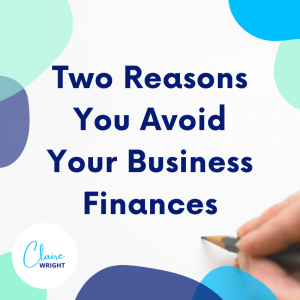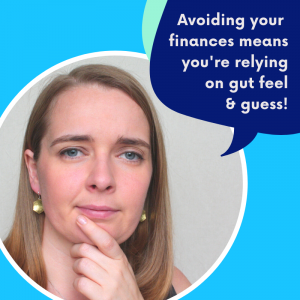Do you find yourself actively avoiding your business finances? Procrasti-cleaning, mindless scrolling or even rearranging the pantry is more appealing? The temptation to avoid business finances, accounting, bookkeeping and the money side of the business is common for sole traders.
But what does avoiding your business finances mean? Can you be sure you can afford that course or admin support to make your Facebook page consistent? Will you know how much tax you’ll need to pay at the end of the year? How will you decide if you need to get a part-time job if you’ve no idea how business is performing?
Not everything in your business can be measured by the amount of cash in your bank account. And if you aren’t separating business banking from personal banking (you should) it’ll be even harder. And if you don’t do your finances you are relying on gut feel and guess for a business you want to support you financially. So let’s look at two common issues that lead to avoiding your business finances and what you can do about them.
Lack of number confidence
The trifecta of process, jargon and software can make bookkeeping and financial management seem unattainable.
But you need to accept that if you’re running a business you need to run the business finances too. Most of the stigma of accounting as difficult relates to big business. Honestly, for most sole traders it is 100% possible and realistic to do their own bookkeeping. Just checking in with a tax accountant a few times a year.
What you need to work on are the practical skills to manage your finances and money. These are learnable skills, accountants were not born with a calculator in hand.
There are a few stages I recommend for straightforward sole traders businesses. Note this advice is not specific or tailored to your circumstances, just a general rule of thumb.
Under $2500 in monthly sales is generally okay using a simple spreadsheet tracking what’s coming in and what’s going out. Over $2500 per month start trialling software so you’ve enough time to learn without any short term reporting. Over $5000 per month, use an ATO linked software, as the GST threshold nears you need to be confident using the software. Learning software and GST at the same time is generally an uphill battle.
Money isn’t important
The ‘money isn’t important’ mindset is where you just want to help clients and have the lifestyle you want. But as I talked about in the money and success post, the lifestyle you want requires a certain amount of money. So ignoring the money can lead to ignoring your lifestyle desires.
This approach is often a push back on lots of limiting beliefs around money and you in relation to money. Beliefs like money makes rich people who are greedy and selfish. Or more money equals more problems, which is why many people resist registering for GST and targeting income over the $75,000 threshold! And then beliefs specific to you as an individual like needing to work ‘hard’, or have a certain level of experience to deserve the money. Maybe you think you aren’t ‘good’ with money because it just burns a hole in your pocket and it’s gone before you know it.
What you need to work on is identifying your primary beliefs around money and your relationship to money. Then you can change those thoughts because beliefs are just thoughts repeated. Look for examples of when you have held onto money. Or rich people who do amazing and generous things in the world. Review when money has actually meant fewer problems, like visiting a relative at short notice or helping someone in need.
Remember, dealing with your business finances is good for business which means it’s good for you.
If you need help to stop avoiding your business finances, learning the practical skills and improving your mindset around doing so then reach out for a free chat about how my work might be able to help.
Watch the Video
Pin for Later


